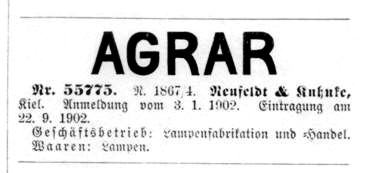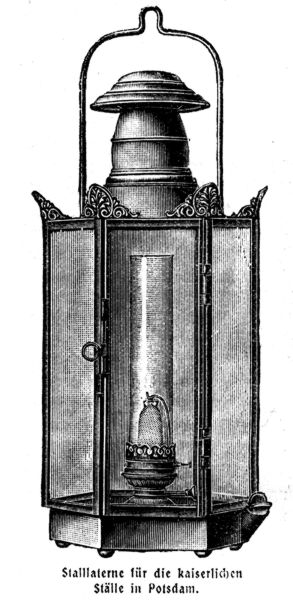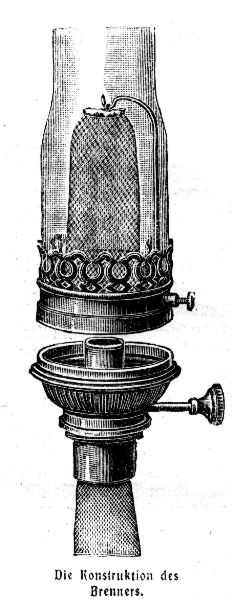|
Some Information About the Alcohol Mantle Lamp Burner Developed by F. H. Aschner |
DEUTSCH  Back to Continental-Licht |
Images of a fully functioning Aschner mantle lamp can be seen on Jürgen Breidenstein's website.
|
("The Library of Conversation and Knowledge") With contributions of the most distinguished authors and scientists as well as numerous images. Volume Six. 1903. Stuttgart · Berlin · Leipzig Union Deutsche Verlagsgesellschaft |
||
|
Alcohol Mantle Lamp System F. H. Aschner. - Germany annually purchases kerosene from abroad that is worth 200 Million Marks, whereas 100 Million Litres of unmarketable methylated spirits are stored. A replacement of kerosene lights by alcohol lights is of the upmost nationaleconomic importance. Until now there has been no suitable alcohol fuelled lamp. Now the Aschner burner produces a light equal to an incandescent gas light. What an expectation for anyone still lacking gas and electricity! A better incandescent light for every hut, as all kerosene lamps can be converted to Aschner lamps. The threads and other connections are interchangeable; the Aschner burner is screwed onto the present fount and, immediately after lighting, produces a bright white incandescent light where a few minutes earlier the reddish glow of a kerosene flame flared. The Aschner burner construction avoids any heating of the fount and so any threat of explosion is prevented. The flame develops only 6 mm above the wick and is carried upward, leaving the wick cold. Any charring , coking, or gumming of the wick is impossible as it only takes up the fuel. |
||
|
||
| That is the reason for the steady and calm light which does not need continuously regulation just as a gas incandescent light. There is no need for trimming or cleaning of the wick; the fuel will not volatilise from the fount. Similar to the pilot light of gas incandescent lights the flame of the Aschner lamp can be turned down and left burning consuming very little alcohol. When required it can be turned up again to produce a full bright light. Operating this alcohol mantle light is elementary. After lifting off the upper part of the burner the wick is lit, the upper part is replaced again, and the mantle immediately produces an intensely white light. Thus any contact with the fragile mantle is avoided when setting the lamp alight. The chimney is of no special shape. Our figures show the construction of the burner and a stable lantern of the Imperial Stables of Potsdam which stood the test very well. About the cost of lighting: The use of an Aschner lamp is cheaper by one third in comparison to kerosene lamps of the same lighting intensity. The burner, chimney, and two mantles retail for six Marks. It is made by Neufeld & Ruhnke[1] company in Kiel. | ||
|
Annotations: [1] In the Stuga-Cabaña Petromax Forum Thomas Ploog and Anton Kaim provided information about the maker: It should read "Neufeldt & Kuhnke". After a merger of "Hanseatische Apparatebaugesellschaft" and "Neufeldt & Kuhnke" the HAGENUK (Hanseatische Apparatebaugesellschaft Neufeldt u. Kuhnke) Company was formed which still exists today in another field of business. See: Wikipedia DE on Hagenuk and Hagenuk Marinekommunikation GmbH (HMK). |
||
|
Trademarks: These two trademarks of "Neufeldt & Kuhnke" were located by Anton Kaim: 
 Anton, Thank You for the trademark information! |
Translation: Erik Leger with a lot of help from Terrence Marsh.

